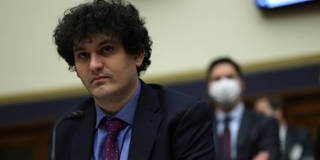In Michael Lewis's highly anticipated book about the founder of the FTX exchange, the disgraced crypto tycoon is shown to be in the habit of calculating an expected value for everything he does. It follows that his alleged fraud was not an accident, but rather a gamble that did not go his way.
CHICAGO – Effective altruists believe they should devote themselves to benefiting others the best they can. Some take this position to extremes by pursuing the highest-paying jobs they can find and then donating their riches to vetted charities that save the most lives per dollar deployed. One of the most famous effective altruists, Sam Bankman-Fried, is currently on trial for fraud.
In Michael Lewis’s insightful new book, Going Infinite, Bankman-Fried is portrayed sympathetically as a brilliant, humane, but emotionally crippled figure. Though he seems to lack the capacity to feel empathy for those around him, he reasons himself into the effective altruists’ utilitarian outlook. He stops eating meat to minimize animal suffering, and he commits to minimizing human suffering as well – including by supporting efforts to address existential threats like out-of-control artificial intelligence.
After earning a physics degree from MIT, Bankman-Fried joined the trading firm Jane Street, where he learned to arbitrage small price differences between assets. He proved to be quite good at quickly identifying, calculating, and executing gambles. But, as Lewis notes, and as Bankman-Fried surely understood, Jane Street simply leached rents from the financial system, rather than doing anything to benefit humanity. Even ignoring that, the millions that Bankman-Fried could ultimately earn there would do little to alleviate human suffering globally.

CHICAGO – Effective altruists believe they should devote themselves to benefiting others the best they can. Some take this position to extremes by pursuing the highest-paying jobs they can find and then donating their riches to vetted charities that save the most lives per dollar deployed. One of the most famous effective altruists, Sam Bankman-Fried, is currently on trial for fraud.
In Michael Lewis’s insightful new book, Going Infinite, Bankman-Fried is portrayed sympathetically as a brilliant, humane, but emotionally crippled figure. Though he seems to lack the capacity to feel empathy for those around him, he reasons himself into the effective altruists’ utilitarian outlook. He stops eating meat to minimize animal suffering, and he commits to minimizing human suffering as well – including by supporting efforts to address existential threats like out-of-control artificial intelligence.
After earning a physics degree from MIT, Bankman-Fried joined the trading firm Jane Street, where he learned to arbitrage small price differences between assets. He proved to be quite good at quickly identifying, calculating, and executing gambles. But, as Lewis notes, and as Bankman-Fried surely understood, Jane Street simply leached rents from the financial system, rather than doing anything to benefit humanity. Even ignoring that, the millions that Bankman-Fried could ultimately earn there would do little to alleviate human suffering globally.